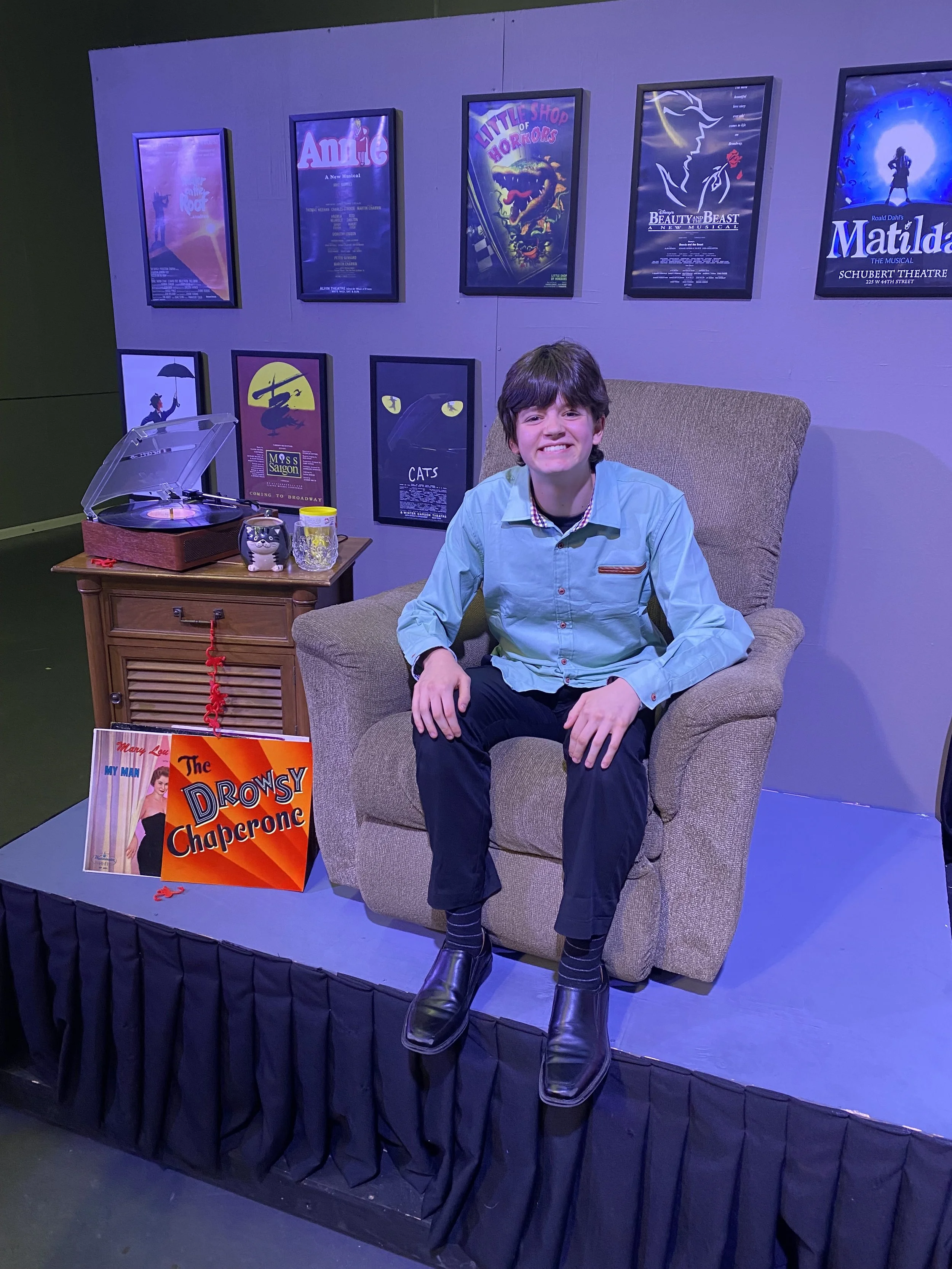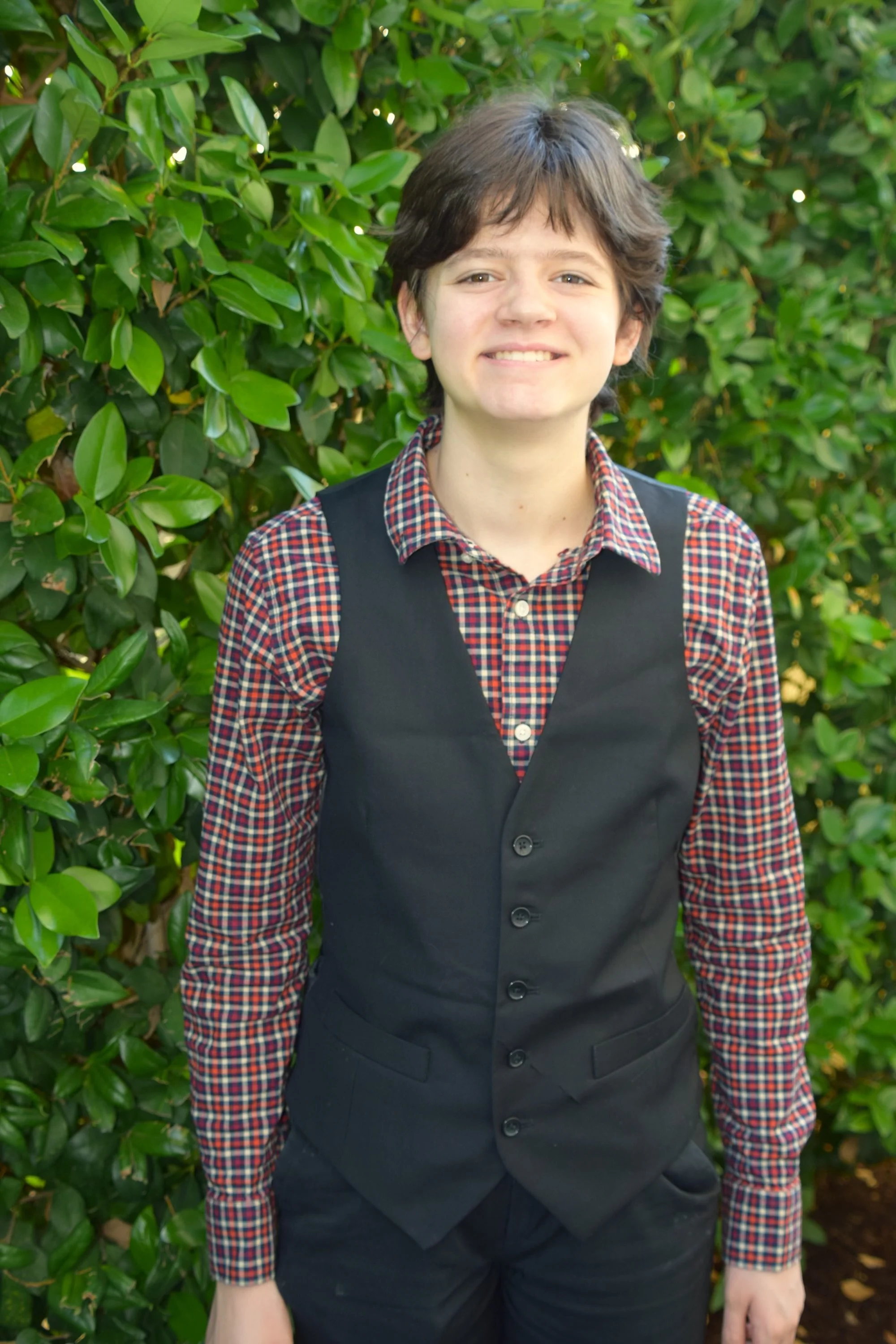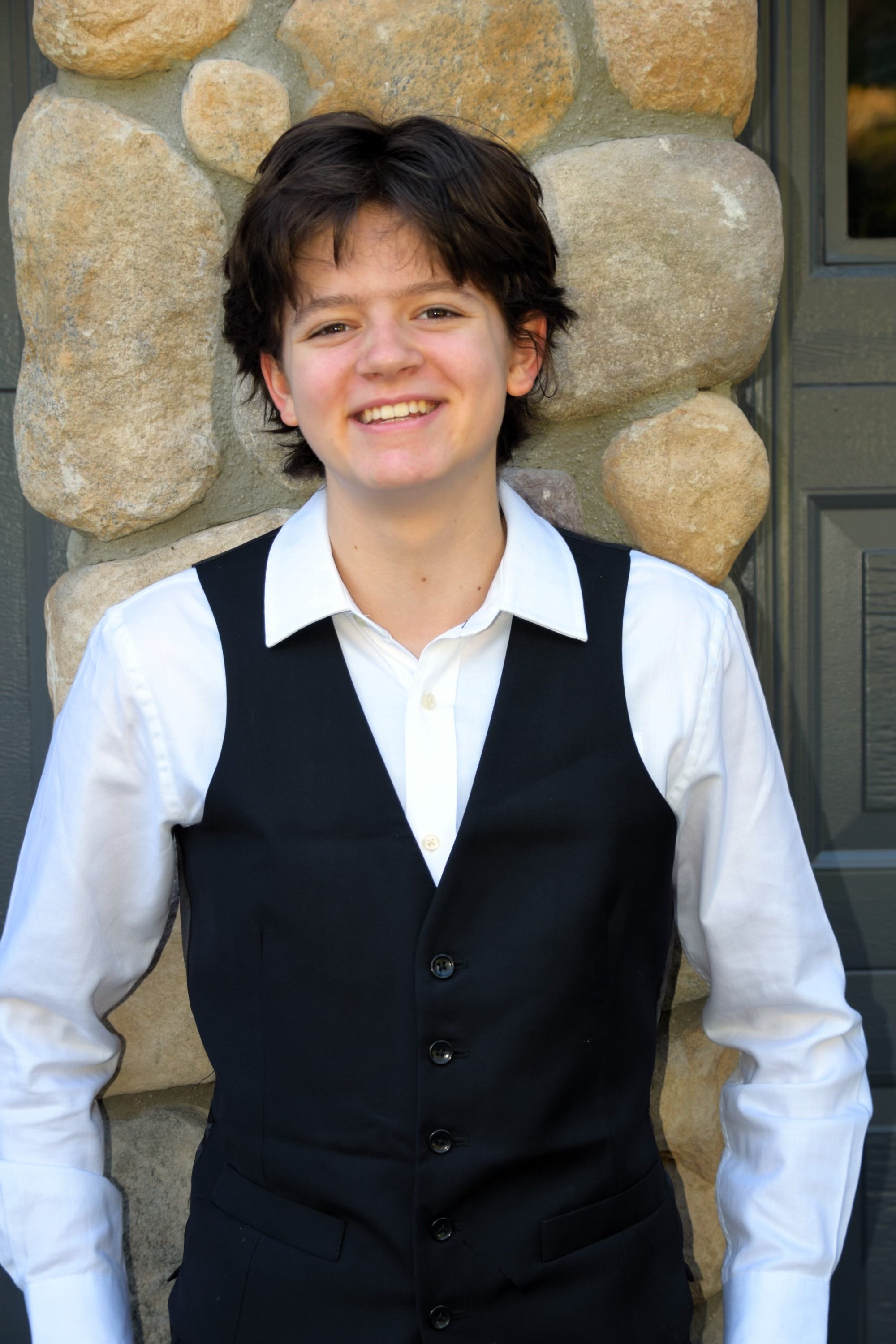At 16, Jean MacKay is already an accomplished pianist, singer, and composer. He’s also a stage actor who played Mr. Macafee in Bye, Bye Birdie as well as the challenging role of Man in Chair in The Drowsy Chaperone. A serious academic, Jean has been taking college courses through ASU, and will graduate early from high school later this year. Intrigued by the bio-medical side of psychology, Jean hopes to become a forensic psychiatrist and study how various substances affect the brain to hopefully help rehabilitate people who have gone through the criminal justice system.
Considering all these remarkable attributes, Jean (he/him) says he becomes frustrated with often being reduced to his identity as a trans person. “That’s a facet of me, but it’s not all of me. It’s okay to celebrate one’s identity—that’s fun, but try to see the person before you see the label.”
Jean grew up in a family that moved around a lot. When asked about his home life as the oldest of six kids who homeschool, he smirks, “There’s a lot of screaming.” An early childhood illness kept Jean out of the first grade for an extended time, and he realized he preferred doing school independently. This kickstarted his online/charter educational path. As the MacKays would move for his father’s job, Jean says he often felt like an outsider navigating the social hierarchy of places like Utah and southern California, where his family now resides. But he says while his social development has perhaps been stunted, charter school has been worth the tradeoff.
For Jean, being trans was “never really a thing for me—I always just thought, ‘I’m a person’.” Jean first heard the word “trans” at age 10. When he looked it up, he thought, “Oh yeah, that’s me,” then didn’t think about it for awhile. Jean’s mother, Allison, said that even as a young child, Jean never gravitated toward baby dolls and playing house like their other children assigned female at birth. He always preferred to dress up like characters like Lightning McQueen, Indiana Jones, or Anikan and play with a Mickey Mouse doll. “He was never on the path of ‘I’m going to be a parent someday’.” But it wasn’t until puberty that Jean began to feel very uncomfortable in his body. Allison says that first he came out as aromantic, then nonbinary, then queer. “It’s a process. He’s still in process. I’m trying to hold space and be open for that to happen.” In the meantime, she marvels at his academic interests and ambition that so strongly juxtapose what she was most interested in at that age: “I was having way too much fun to want to graduate early,” she laughs.
Allison says that each time a new aspect of Jean’s identity comes up, like when he decided to change his name, she’s gone into her prayer closet and pleaded, “Show me how I can relate to this and understand. And every time I’m shown—oh yeah, this was always that way. I just imposed my belief system onto it. Or I just never thought of it that way, but it is true.” Allison says she’s now able to better navigate a journey of endless possibilities “because we let them be.” When Jean was younger, he cut off his really long hair to donate it to a foundation for leukemia. A few years ago, he chose to do the same; and this time for Allison, it felt like an important milestone, like, “I’m never going back to that little girl; I’m leaving her behind. It felt like layer after layer of cultural and familial expectations were removed.”
Many members of the MacKay’s extended family first expressed that calling Jean by Jean seemed to come out of left field. But Allison would clarify, “No, Jean’s been doing this since he was eight. Jean’s always had issues with clothes. Now, he has his own style and everyone comments how much they love how Jean dresses.” She’s grateful he’s shed the black, baggy clothes that seemed to characterize his mood for awhile.
Jean says, “I used to be part of a church that was not necessarily accepting of people like me, and I didn’t like what puberty was doing to my body. Those two things made me spiral, and I was pretty depressed for about a year.” Now Jean is more comfortable expressing his identity as both trans and asexual. He says when his parents first gave him the traditional “sex talk,” he thought, “Yeah, I never want to do that.” Being asexual while being raised in the LDS church environment was “not the worst thing in the world because with the law of chastity, people were constantly telling you, ‘Don’t do this’,” says Jean. “But what bothered me was the expectation I had to get married and be a mother and have kids. Most of the stuff they taught focused on marriage and family, which are not bad things, but they’re not for me. This expectation was frustrating—I felt like I was being diminished. To have my worth identified by things I don’t identify with was not interesting to me.” Jean says the things that interest him most in life—career and music—are what he wishes to be the most identifying parts of his life.
Allison embraces a set of beliefs and practices about the divine feminine and Godhead that differentiate her from many mainstream members of the LDS faith. Being verbal about this as well as some aspects of church history that troubled her led to her excommunication several years ago, which she now sees as a blessing because it gave Jean a safer place to land at home when he made it obvious the church didn’t work for him. “Jean saw me going through that process publicly, and it allowed him to have a safer space to talk about it at home. So in some ways, I see how the experience I went through made it safer for Jean to leave – and I would take the flack for anyone needing to do that. Because there were months we didn’t know if Jean was going to be able to stay here (on earth), if I can even make that one thing easier, then that’s ok.”
Allison was raised in a traditional LDS home and has learned unique lessons with raising each of her kids. But regarding Jean, she says, “I’m so grateful God would soften my heart to this child so that he could teach me who he is, and open this sphere of possibilities of who we are as humans, because before, I wouldn’t look. I was just doing and believing what I was told. I wouldn’t look and ask for myself. That was so wrong. I am so grateful Jean was courageous enough to show me that, and preserve our relationship. And I know Jean will teach me so much for the rest of my life.”
Jean’s father and some of his siblings still attend church, and Jean himself was expected to go until age 14 when the family realized it was in no one’s best interests to mandate that anymore. He had struggled to connect with many of the church milestones over the years, including at age 11, going to the St. Louis temple for the first time with his dad, which was not quite the experience he had anticipated it would be. But Jean says, “The thing that broke my shelf was going to seminary. I got it into my head that I could tear down all the things in my head by tearing down my seminary teachers and their classes. But I realized trying to tear down a religion by mercilessly tormenting seminary teachers isn’t going to help—or produce anything besides tormented seminary teachers. I don’t have a problem with people being a part of the church—it’s not a bad thing; it’s just not for me.”
Nowadays, Jean says he’s in remission from any religious PTSD he may have faced, but says spirituality isn’t really a part of his life anymore. While he considers the term “atheist” as useful shorthand and lets people know he’s not really interested in those discussions, he says he’s probably more agnostic, though he doesn’t love how that term essentially “puts him on the bench, and that’s not it.” Jean says, “What does matter is the things we do in this life and how we treat others.” Jean says he’d like religious people to know that the reason so many may perceive atheists as “angry” is perhaps misguided. “They’re not angry at you, the religious person, but angry at themselves. They feel tricked. Now that they see closer to their truth, they’re frustrated by harm they faced. They’re not trying to tear down your faith nor are they possessed by the devil, but frustrated because they don’t want others to be hurt anymore, the same way they have.”
Regarding the current political landscape, Jean advises, “No amount of anti-trans legislation will stop people from being trans; but it is going to result in dead children. So if you’re really pro-family or pro-life, please stop it. We need to foster understanding. I get it, if you’re unaware of what being trans means, it can sound scary or confusing. But my advice would be to talk to trans people and see how and why they feel the way they do.”
Upon reflecting on her experience getting to raise a child as unique and special as Jean, Allison advises, “Parents, set aside what you ‘know’ and listen – our kids are such amazing teachers. They are so smart.” Allison now believes Jean’s bravery might be paving the way as one of the oldest of 40 cousins. She wonders, “How many of those kids might one day say, ‘Ok, Jean did that; I can do this.’ And how many will sleep on our couch if their parents kick them out? Those who come after Jean won’t have to be alone. Jean can shine that light.”




















